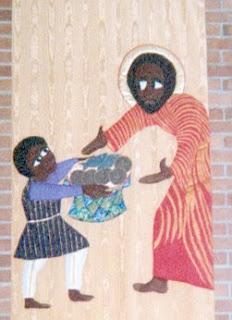Most of us grew up with Mama's who helped us understand that there are two kinds of manners. We had "at home" manners and “company” manners. We might get away with elbows on the table at home, which was never allowed in restaurants or at grandma's house.
What happens if we allow ourselves to have two kinds of grammar about our relationship with God? We all know folks full of faith and religion - at church - but let 'em get out of the parking lot; let 'em get into the workplace, at home or at school; and the name o' Jesus never crosses their lips. When we don't name the name of Jesus in public - our faith may be a mile wide, but it's only an inch deep!
Many folks, who say they're Christians, but speak with two kinds of grammar, suffer from an identity problem. Oh, they know WHO they are; they just forget to tell other people WHOSE they are! They can recite Bible verses; proclaim doctrines, and even utter grace over a holiday meal, but the story of God's love, in Jesus, is always about ancient history, and never about God present and active in their own day-to-day lives.
The challenge to Christians is to be able to declare publicly what they believe, out of our own experience, not out of our book learning. It's the difference between saying, "I know
ABOUT Jesus" and "I KNOW Jesus."
When, out of the blue, something good happens to you do you say, "This is my lucky day," or do you say, "God always has a ram in the bush!" (Genesis 22:13-14) When we speak a public grammar of grace we “enflesh” and make present the power of God, both in our own heart and in the ears of another. This power is the power to transform lives and change the world’s manners.
The way we talk shapes how we behave. The world doesn't need more church members who speak nicely and do random acts of kindness. This sort of grammar reduces the power of God to just another language of rehabilitation - competing with all the other feel-good messages the world tries to lay on us.
What the world does need is more disciples of Jesus; believing actors whose words and deeds tell powerful testimonies of God's nearness, forgiveness, and love. And who, as disciples, work for justice and fairness; act out messages of hope and transformation.
If your message is muddled, if your behavior is befuddling, maybe it's been too long since you did what those first disciples of Jesus did. Maybe it's been too long since you met weekly to: hear God's bible word; study the teachings of the apostles; and dine at a table where the bread is passed and the wine is poured in the name of Jesus.
First Trinity is a place where Jesus teaches the grammar of grace. Come see! The place is full of learners just like you!
Monday, October 16, 2006
Subscribe to:
Post Comments (Atom)




No comments:
Post a Comment